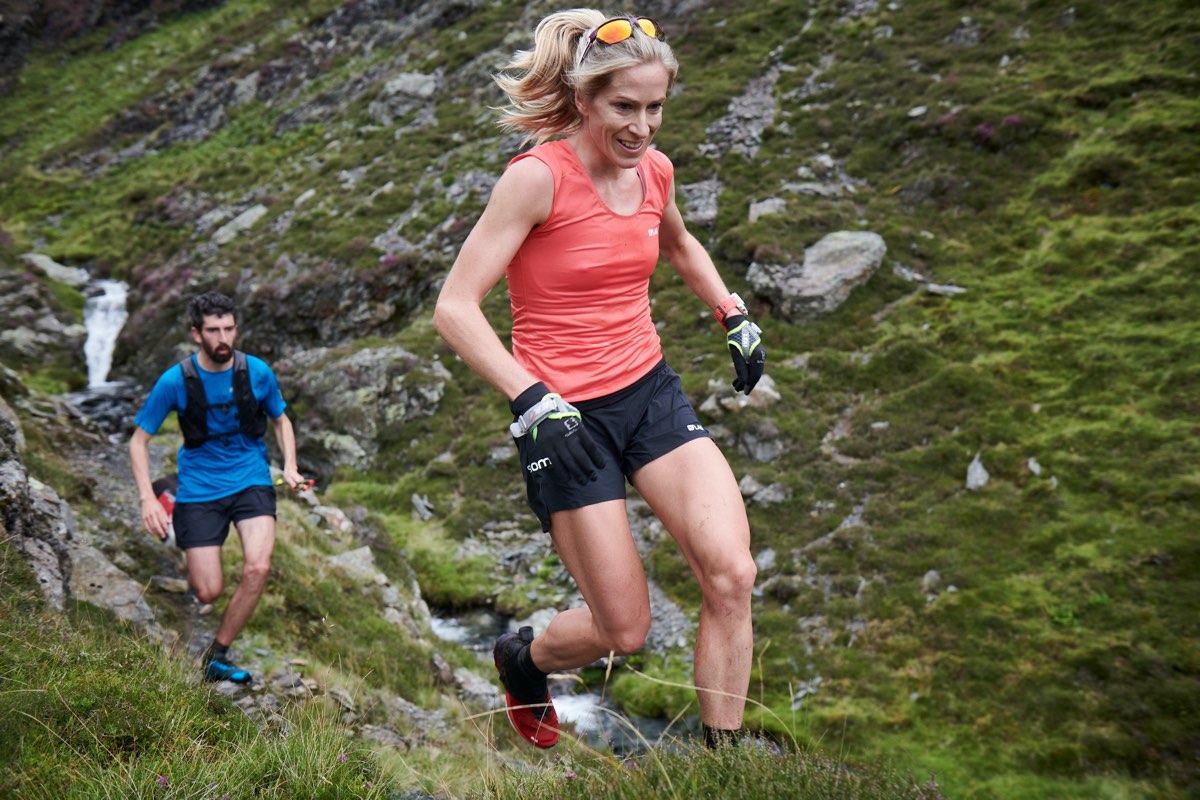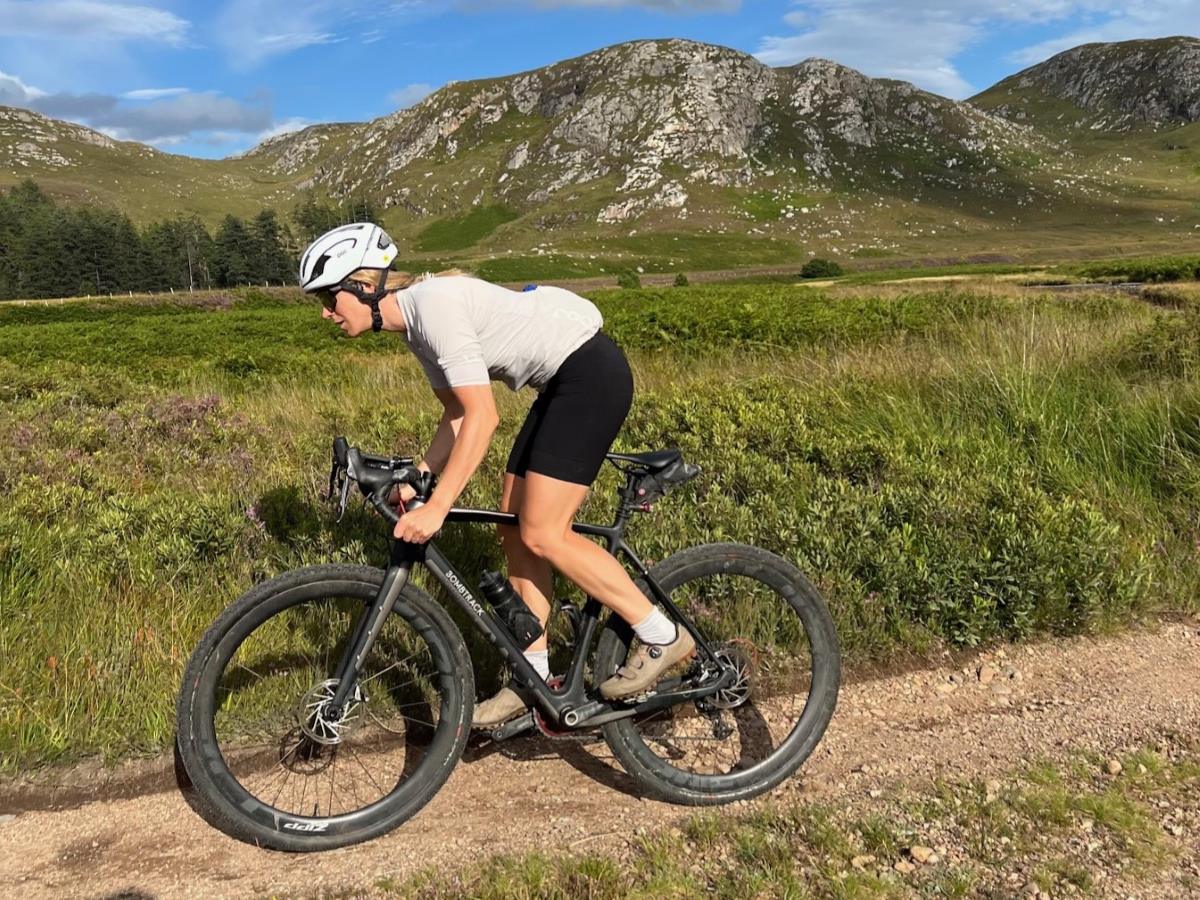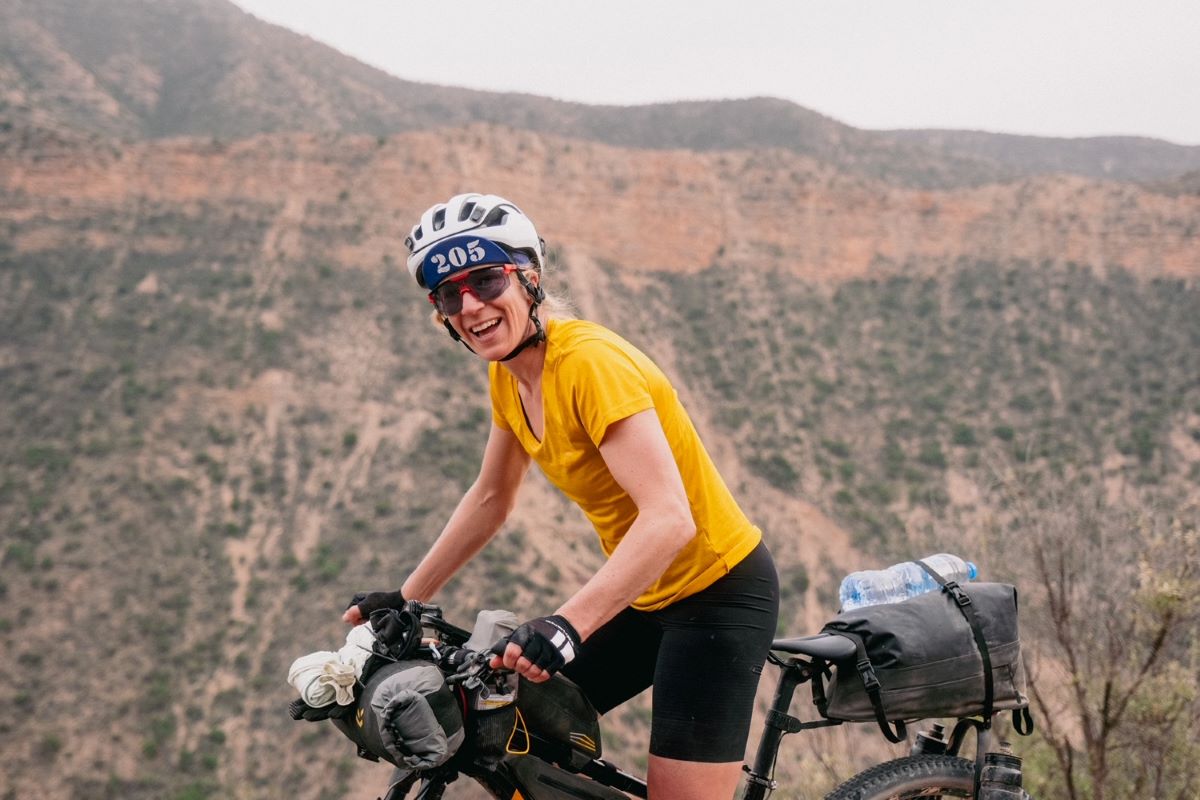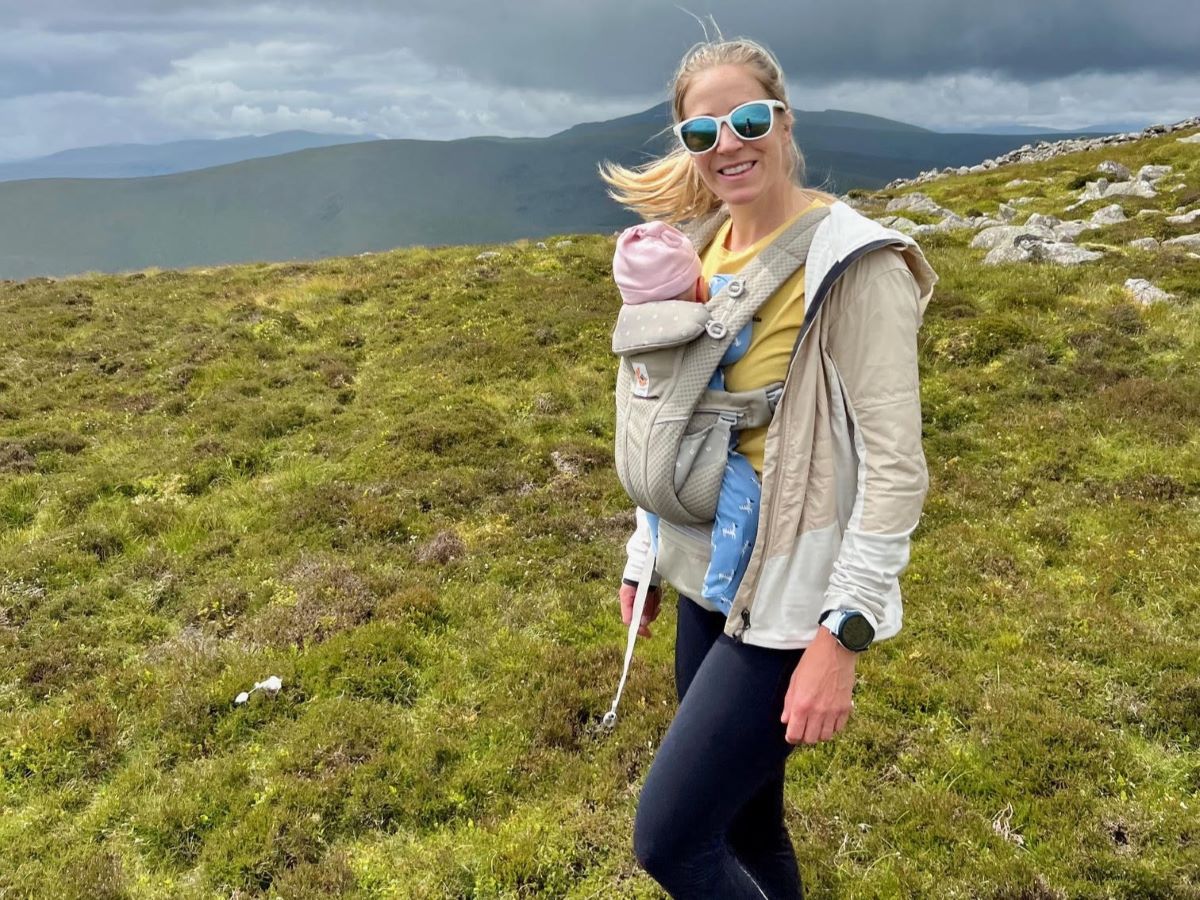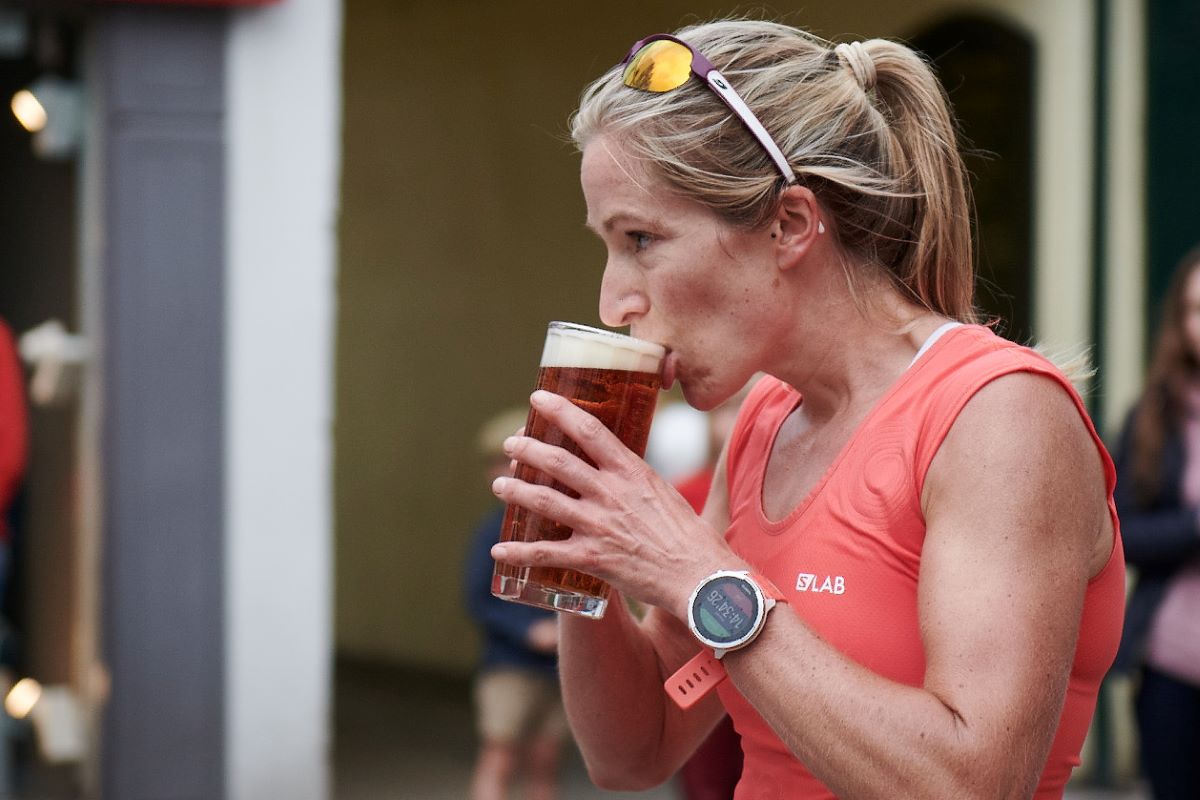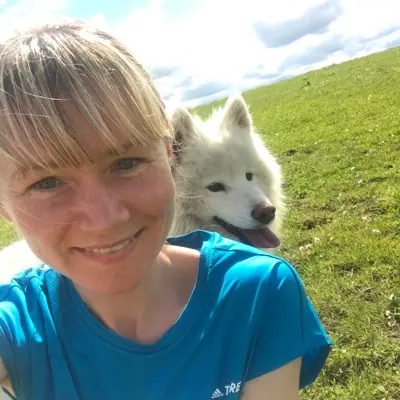In 2021, British pediatrician Beth Pascall won the Western States 100 in what was at the time one of the fastest women’s times ever. Having already set the women’s record on the Bob Graham Round in England’s Lake District the year prior, Pascall was undoubtedly one of the world’s leading ultra-trail women.
Since then, a persistent pelvis injury has kept her away from running, but the now-mom-of-one has continued to find ways to explore and be active. We caught up with her to recap her running career and hear what else she’s been up to over the past few years.

Beth Pascall leading the women at mile 30 of the 2021 Western States 100. Photo: iRunFar/Bryon Powell
Early Years
Beth Pascall grew up in Somerset, in the Southwest of England, and had an active childhood. She said, “It was very rural, and my parents had a small holding [farm], so I spent my time outside running around, chasing animals. It was a very outdoorsy childhood. I did all the sports; I did a bit of running growing up, but not any more than I did every sport available.”
When Pascall went to university to study medicine, rowing was her primary sport. She quickly rose through the ranks to become an elite-level lightweight rower but found the demands of training alongside full-time athletes in a group environment were not compatible with the demands of medical school.
She said, “When you row, you’re generally training with a group — my training group, they were all full-time athletes. I was trying to fit it around the clinical years of medical school, and I just didn’t have the time to do it.”
In search of a sport that Pascall could better fit in around her schedule, she turned to running: “I was like, What can I do at 5 a.m., or 9 p.m., that I can do on my own?’ And running was that. Rather than starting with traditional distances, Pascall was immediately drawn to ultrarunning. She said, “I’d read some books on ultrarunning, and I was like, That sounds wild. Maybe I could run 100 miles.”
Finding Ultrarunning
It wasn’t long before she did just that. Pascall’s first run at the distance was the popular Lakeland 100 Mile in the Lake District, and without having any real competitive ambitions, she placed second. A seed was sown.
She said, “When I decided to run it, I thought this was something I was just going to do once, just to see if running 100 miles was possible. It was definitely not about trying to do well. But I did it and thought, That was really fun, and I did better than I thought I would. I caught the bug after that.”
Throughout the next few years, Pascall continued to run well and racked up places and wins without any particular training structure or plan. Then, in 2016, she learned of an opportunity to represent Great Britain at the Trail World Championships.
She said, “We had a trial race, the Highland Fling 53 Mile. I wasn’t aware of the process until, I think, it was Damian Hall who mentioned this trial race to me a couple of weeks before, and I decided to do it, and I was very surprised to make the team.”
A few months out from Trail World Champs, Pascall ran the Lakeland 100 Mile for the second time, two years after her debut, winning and taking four hours off her previous time. She had just started working with a coach, and it was clear she had a bright future in running ahead of her.
Soon, Pascall was lining up at the most competitive international ultra-trail races, making her presence felt. In 2017, she placed second behind Switzerland’s Andrea Huser in the Madeira Island Ultra-Trail and said, “I was still pretty new to racing internationally, and it was a big surprise to come second. Around that time, Andrea was someone that I really looked up to. I was excited to even be on the same start line as her. She was a big role model.”
A right of passage for many, Pascall headed to Chamonix, France, later that year for her UTMB debut, which sadly ended in a DNF (did not finish). Pascall would return again and again to UTMB, placing fourth in 2018, fifth in 2019, with another DNF in 2021, but maintained a love-hate relationship with the race, saying, “To be honest, I don’t feel I’ve ever had a good race at UTMB. I either don’t finish, or I finish, and my position might look ok, but I’ve had a terrible time! So, it’s not a race I feel like I’ve ever done justice.”
Bob Graham Round
Pascall continued to be a prolific racer both at home and abroad. In 2018, as well as fourth at UTMB, she also took fourth at Transgrancanaria, and rejoined Team Great Britain for another Trail World Champs. In 2019, she won the Highland Fling 53 Mile and the North Downs Way 50 Mile before heading to the U.S. for her Western States 100 debut. She placed fourth, securing her place on the start line for another year, and had plans for 2020 to be a big year of racing. Of course, 2020 had other ideas.
She said, “In 2020, I was supposed to take a sabbatical from work and go do the Western States 100, but obviously that didn’t happen [due to the COVID-19 pandemic.] I’d always wanted to do a Bob Graham Round, but I was prioritizing races. It seemed like the obvious time to do it.”
At that time, the legendary Jasmin Paris held the women’s Bob Graham Round record. Pascall wasn’t overly confident that she could break it and said she would have been more than happy to take the second fastest time, but nonetheless, she planned a schedule for the round based on a record attempt. The round consists of summiting 42 fells over a route about 66 miles long with around 27,000 feet of climbing. The route is generally divided into five legs, with road crossings in between as resupply points.
The day went well, and when she got three of five legs completed, Pascall started to feel like the record was possible. She said, “I’d been ahead of my schedule for a while and just waiting to blow up, but I got to [that point] still feeling good and thought maybe it might happen.”
She made it back to Moot Hall, the start and finish location in downtown Keswick, in 14 hours, 34 minutes, and 26 seconds — taking some 50 minutes off Paris’s mark and making fell running history.
Western States 100
In 2021, travel resumed, and Pascall could finally realize the plans she’d made for 2020. She said, “I had a six-month sabbatical from work. I went out for close to 90 days, and I raced the Canyons 100k in April and then the Western States 100. It was a long-term plan to have a little break from work and go out and train specifically for the Western States 100.”
As always, the Canyons 100k was fiercely competitive, but Pascall was unstoppable and came away with a win and a course record, with all omens looking good for her return to the Western States 100. After a training block in Flagstaff, Arizona, which helped with heat adaptation, she had a spectacular day at the race, leading from start to finish and winning in 17:10:42 — which was, at that time, the second fastest women’s time on record.
She said of the race, “The races you’ve done well in, in retrospect, seem like the easiest thing in the world. You suffer more in a race where you don’t do well. It was just one of those days when everything clicked.”
The Onset of Injury
However, in the autumn of 2021, a pelvis injury — an inflammation of the pubic bones at the center of the pelvis — first reared its head. Like many injuries, it started small. Pascall recalls, “It started with just a niggle. It was something that I could easily run through, and I was seeing physiotherapists, and they were just like, ‘Cut back your running volume a bit, and it should sort itself out.’ But it wasn’t really getting better.”
At the same time, Pascall was running through a foot injury she’d had for some time. She said, “I had a Morton’s neuroma, that I’d had for years. It’s a problem with the nerve in the foot. It wasn’t really a problem, but I thought, I’ll just get this fixed, and have that operation while I have this other niggle going on.”
Unfortunately, following the surgery on her foot, Pascall’s pelvis injury only intensified. She said, “There was a six-month period when I had pain all the time, even at rest or walking around at work. It was challenging because, in my mind, I was doing absolutely everything: seeing the best people, doing all my exercises, and doing exactly what I was supposed to be doing, and it just got worse and worse. I really couldn’t do anything. I was doing a small amount of swimming with a pull buoy, and that was about it.”
After a difficult six months, Pascall began working with different physios, changed up her treatment, and saw an improvement. She said, “It started to get better, and I did start running again, but then it came back after maybe three months of running. I was back to where I started with having pain all the time again.”
Life on Two Wheels
The roller coaster of injury continued in this vein, but while running continued to be stop-start, another sport presented itself just when she needed it — cycling. What started as a rehabilitation exercise soon became a new passion in its own right, and Pascall began competing in endurance gravel races and mountain biking.
She said, “I’ve done lots of random stuff. From the outside, it would look like I’m a confused cyclist. Just trying different things and finding out what I enjoy the most.”
In August of 2022, she completed her first bike race, the Raiders Gravel three-day stage race in Scotland, racing 75 kilometers per day, and came away with second place. She also developed a love for mountain biking and said, “We’ve got really good mountain biking around where we live in the Lake District.”
While exploring her new sport, Pascall set a speed record of a different kind, on the 200-kilometer Lakeland 200k mountain biking route. She added, “I also did a bikepacking race in Morocco. So really a little bit of everything.”
A New Beginning
Then, in the spring of 2024, Pascall embarked on a huge adventure of a different kind — motherhood. Her daughter Fern was born in April. Despite fatigue and new demands at work, she stayed active throughout the pregnancy and said, “Physically, I was fine. I still have the injury, so I couldn’t walk a lot or run, but I did plenty of cycling.”
She added, “I felt very tired all the time. I had also just started a new job, and it was a two-hour drive away, so I had this four-hour roundtrip commute. I could move, but I was always so tired.”
Over the past few months, while enjoying time outdoors with Fern at home in the Lake District, where she and her husband moved two-and-a-half years ago, Pascall has also started to see some light at the end of the tunnel for her pelvis injury.
She said, “I wouldn’t say this [injury] is anything that will ever go away. So, it’s not just gone. But there has been a gradual improvement — not daily, but month to month — since Fern was born. There’s still been lots of ups and downs, but I can adapt my training and do small amounts of running, and it’s manageable.”
She went on, “I have an open mind, but realistically, I think I will only ever be able to do small amounts of running but maintain my cardiovascular fitness through cycling. I think that’s the best possible scenario.”
Pascall feels quite positive about the prospect of trading two shoes for two wheels, and added, “I have got quite into cycling over the last few years, I’ve been enjoying it more and more.”
For now, all her activities revolve around Fern, who is already experiencing the same idyllic start to life in the outdoors that Pascall had herself. She said, “It has been really fun, spending lots of time at home in the Lakes. When you’re not working, you get to make the most of living in an amazing place and spending lots of time outdoors. Everything is with [Fern]. So I’ll walk with her, go out on the bike with her in the trailer, and there’s a great mom community around here, with lots of moms doing outdoorsy things, so it’s been amazing.”
Throughout my conversation with Beth Pascall, I was struck by how many times she has reinvented herself throughout her 37-year life so far. Regardless of whether the future holds a return to competitive running for her, it is clear that she will always find an outlet for her energy and will never shy away from a new challenge.
Call for Comments
Have you followed Beth Pascall’s career? What are your highlights?

